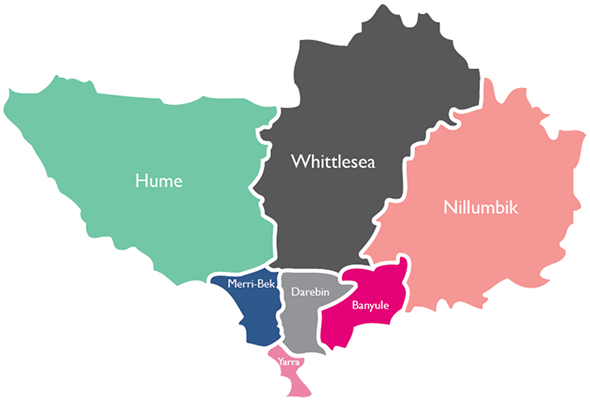About us
WHIN is the women’s health promotion and advocacy organisation for the northern metropolitan region of Melbourne (NMR).
Our Vision
Women and gender diverse people in the north have voice, choice and power in all aspects of their health, safety and wellbeing

Our Mission
HIN works to eliminate gender inequities and improve the health, safety and wellbeing of women and gender diverse people.

Our Values
We are a feminist, ethical, inclusive, courageous and collaborative organisation.

WHIN is the women’s health promotion and advocacy organisation for the northern metropolitan region of Melbourne (NMR).
We are:
- not-for-profit
- member-based
- run for and by women and gender-diverse people
We:
- provide health information and education to women and organisations
- develop policy and research
- create innovative resources
- train health and welfare professionals
- support and partner with other organisations on issues of strategic importance.
Our region
We support women’s health in the northern metropolitan region (NMR) of Melbourne. The NMR’s population is increasing rapidly in the growth corridors extending through Hume and Whittlesea.
- Our region’s suburbs are diverse in ethnicity, socio-economic status and infrastructure.
- Over 41 percent of females living in WHIN’s region speak a language other than English at home.
- Aboriginal and Torres Strait Islander Australians number 6,396 individuals (0.7%) of the NMR population, 51.9% of whom are female (Australian Bureau of Statistics, 2016, ABS Table Builder).

“Before I found WHIN, I felt like I was navigating everything alone—my safety, my health, my future. But from the moment I walked through their doors, I felt seen. They didn’t just offer support—they offered dignity. Through their programs, I gained the confidence to rebuild my life, connect with others, and advocate for myself. WHIN helped me find my voice, and now I use it to help others.”
– A survivor and community advocate, Northern Melbourne
Our staff bring experience, diversity, knowledge and passion in working to strengthen women’s health, safety and wellbeing.
Gender Equity, Health and Wellbeing
Gender powerfully shapes the health, safety and wellbeing of our community. Equity approaches recognise that we do not function on a level playing field.
Historical and social disadvantages prevent women from benefiting fully from society’s resources. Gender equity approaches seek to ensure fairness and justice when distributing benefits and responsibilities between women and men.
Preventing gender-based Violence
WHIN leads regional efforts to prevent gender-based violence through the Building a Respectful Community Partnership. This initiative engages local councils, health services, and community organizations to promote respectful relationships, challenge harmful gender norms, and foster safer communities.
Sexual and reproductive health
WHIN’s Freedom, Respect and Equity in Sexual Health (FRESH) Strategy 2022–2026 aims to improve access to sexual and reproductive health services across Melbourne’s north. It focuses on inclusive education, culturally safe care, and advocacy for reproductive rights, including abortion access.
Family violence system leadership
Through the Northern Integrated Family Violence Services (NIFVS) partnership, WHIN provides system leadership across Melbourne’s northern region. This includes workforce development, interagency coordination, and strategic planning to strengthen responses to family violence and support victim-survivors.
Applying a Gender lens to climate action and disaster planning
WHIN integrates gender equity into climate resilience and disaster preparedness. By applying a gender lens, they ensure that women and gender-diverse people’s needs, safety, and leadership are central in planning for emergencies and environmental challenges.
Past work including gambling and violence against women
WHIN has previously explored the intersection of gambling and violence against women, highlighting how financial abuse and gambling-related harm can exacerbate family violence. Their past projects have informed policy and service responses in this emerging area.